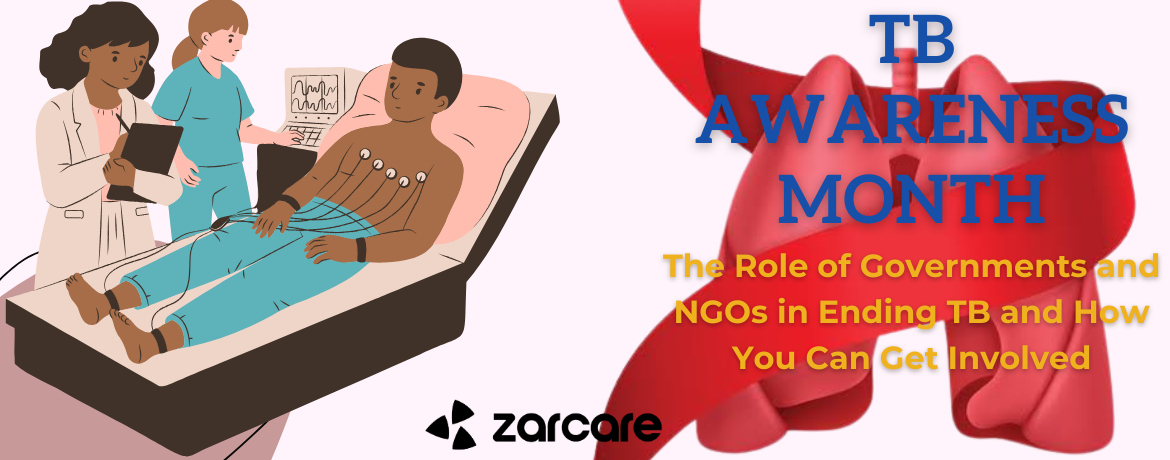TB Awareness Month: The Role of Governments and NGOs in Ending TB and How You Can Get Involved

March marks TB Awareness Month, a dedicated time to raise awareness about one of the deadliest infectious diseases globally—tuberculosis (TB). Despite being both preventable and treatable, TB continues to claim millions of lives each year, particularly among vulnerable populations in low- and middle-income countries. As global health systems tackle the ongoing challenge of TB, governments and non-governmental organisations (NGOs) play crucial roles in the fight against this disease. This blog will explore how these organisations contribute to the battle to end TB and how you can get involved in this critical global health cause. According to the World Health Organization (WHO), TB is among the top ten causes of death worldwide. In 2022, approximately 10.6 million people fell ill with TB, and 1.6 million died from the disease. Despite the availability of effective treatments, challenges such as inadequate access to healthcare, poverty, stigma, and the emergence of drug-resistant TB (DR-TB) hinder efforts to eliminate this disease. To eradicate TB, global and national entities must collaborate, pool resources, and accelerate efforts to address the underlying causes perpetuating its spread. The good news is that with sustained efforts and increased funding, the global community can meet the WHO’s target of ending the TB epidemic by 2035. Governments have a pivotal role in shaping health policies, allocating resources, and establishing the necessary infrastructure to combat TB. Key areas where governments can make an impact include: Governments must ensure national health systems are equipped to diagnose, treat, and prevent TB. This involves investing in better diagnostic technologies, ensuring access to effective treatments, and making TB medications affordable, especially in resource-limited settings. National governments must create clear, evidence-based policies that prioritise TB control and ensure resources are allocated effectively. This includes launching public health campaigns, collaborating with local healthcare providers, and increasing support for high-risk communities, such as people living with HIV and those in crowded, unsanitary conditions. Accurate data on TB prevalence, treatment outcomes, and resistance patterns are essential for effective planning and monitoring of TB control efforts. Governments must invest in robust surveillance systems to track TB trends, detect outbreaks early, and make informed resource allocation decisions. Governments should lead advocacy efforts to raise awareness and educate the public on the importance of TB prevention, early detection, and treatment. Reducing the stigma surrounding TB is crucial to ensure affected individuals seek necessary care without fear of discrimination. While governments are responsible for establishing the framework for TB control, NGOs are instrumental in driving grassroots-level interventions, advocacy, and support for affected populations. Organisations like the Stop TB Partnership and Médecins Sans Frontières (Doctors Without Borders) often operate in resource-limited areas and provide critical services, including: NGOs work directly with communities to provide TB education, patient support, and treatment adherence programs. By building community trust, these organisations help reduce stigma and encourage individuals to seek care at the first signs of TB symptoms. NGOs invest in research to explore new diagnostic tools, treatment options, and vaccines. They also support the development of new TB medications, particularly in response to the growing threat of drug-resistant TB. NGOs advocate for increased funding for TB prevention and care. They rally support from governments, international organisations, and the private sector to ensure sufficient resources are allocated to TB programs. They also raise public awareness about the global burden of TB, urging policymakers to prioritise it on national and international agendas. In countries with weak healthcare systems, NGOs frequently provide direct medical care to TB patients. They often supply medications, offer free treatment, and provide logistical support to ensure patients receive the necessary care. Ending TB may seem daunting, but everyone has a role to play. Whether you are an individual, part of a corporation, or represent an organisation, you can make a difference. The fight against tuberculosis (TB) requires a collective global effort. Governments must implement strong policies and invest in healthcare, while non-governmental organisations (NGOs) are crucial in supporting communities and advocating for change. You can also contribute to the mission of ending TB by getting involved, whether through raising awareness, supporting NGOs, or advocating for policy changes. Together, we can reduce the burden of TB and work towards a world where no one dies from a preventable and treatable disease. #TBawarenessmonth #EndTB #GlobalHealth #StopTB TakeAction #NGOs #Governments #HealthAdvocacy #ZARCAREThe Current State of TB
The Role of Governments in Ending TB
1. Strengthening Healthcare Systems
2. Policy Development and Implementation
3. Data Collection and Surveillance
4. Advocacy and Education
The Role of NGOs in the Fight Against TB
1. Community Outreach and Support
2. Research and Innovation
3. Funding and Advocacy
4. Direct Medical Care
How You Can Get Involved in Ending TB
Conclusion
